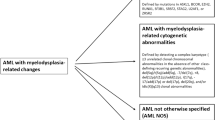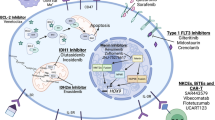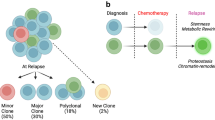Abstract
Myelodysplastic syndromes (MDS) represent a spectrum of bone marrow failure with variable outcome. Patients with “lower-risk” disease have an expected median survival measured in years, and a low risk of leukemia progression. Patients with “higher-risk” MDS, on the other hand, have expected survival measured in months without treatment and rapid leukemia progression. The outcome of those distinct groups can be explained by different underlying disease biology. In clinical practice, patients are stratified into risk groups based on prognostic models, most commonly the International Prognostic Scoring System (IPSS). In higher-risk disease, the standard of care is hypomethylating agents to extend survival and suppress leukemia potential, and consideration of allogeneic stem cell transplantation, which remains the only curative option. Patients classified as having lower-risk disease begin treatment with management focused on ameliorating hematologic deficits, related symptoms, or both. This review of lower-risk MDS highlights the biology of the disease and models for risk stratification. We use a case-based format to discuss current options for treatment, including erythropoiesis-stimulating agents, hypomethylating agents, lenalidomide, immunosuppressive therapy, supportive care, and investigational agents.

Similar content being viewed by others
References
Papers of particular interest, published recently, have been highlighted as: •• Of major importance
Bennett JM, Komrokji R, Kouides P. The myelodysplastic syndromes. In: Abeloff M, Armitage J, Niederhuber J, et al., editors. Clinical oncology. 3rd ed. New York: Churchill Livingstone; 2004. p. 2849–81.
Bennett JM, Komrokji RS. The myelodysplastic syndromes: diagnosis, molecular biology and risk assessment. Hematology (Amsterdam, Netherlands). 2005;10 Suppl 1:258–69.
Epling-Burnette PK, List AF. Advancements in the molecular pathogenesis of myelodysplastic syndrome. Curr Opin Hematol. 2009;16:70–6.
•• Boultwood J, Pellagatti A, McKenzie AN, Wainscoat JS. Advances in the 5q- syndrome. Blood 2010;116:5803–11. This review article highlights recent advances in understanding the biology of del(5q) MDS.
Garcia-Manero G. Demethylating agents in myeloid malignancies. Curr Opin Oncol. 2008;20:705–10.
Epling-Burnette PK, Painter JS, Rollison DE, et al. Prevalence and clinical association of clonal T-cell expansions in myelodysplastic syndrome. Leukemia. 2007;21:659–67.
Zou JX, Rollison DE, Boulware D, et al. Altered naive and memory CD4+ T-cell homeostasis and immunosenescence characterize younger patients with myelodysplastic syndrome. Leukemia. 2009;23:1288–96.
Bennett JM, Catovsky D, Daniel MT, et al. Proposals for the classification of the myelodysplastic syndromes. Br J Haematol. 1982;51:189–99.
Vardiman JW, Harris NL, Brunning RD. The World Health Organization (WHO) classification of the myeloid neoplasms. Blood. 2002;100:2292–302.
Komrokji R, Bennett JM. What Is “WHO”?: Myelodysplastic syndrome classification and prognosis. ASCO Educational Book 2009:413–419.
Greenberg P, Cox C, LeBeau MM, et al. International scoring system for evaluating prognosis in myelodysplastic syndromes. Blood. 1997;89:2079–88.
Malcovati L, Germing U, Kuendgen A, et al. Time-dependent prognostic scoring system for predicting survival and leukemic evolution in myelodysplastic syndromes. J Clin Oncol. 2007;25:3503–10.
•• Greenberg PL, Attar E, Bennett JM, et al. Myelodysplastic syndromes. J Natl Compr Canc Netw. 2011;9(1):30–56. These are recently updated NCCN guidelines for the management of MDS.
Kantarjian H, O’Brien S, Ravandi F, et al. Proposal for a new risk model in myelodysplastic syndrome that accounts for events not considered in the original International Prognostic Scoring System. Cancer. 2008;113(6):1351–61.
Cheson BD, Bennett JM, Kantarjian H, et al. Report of an international working group to standardize response criteria for myelodysplastic syndromes. Blood. 2000;96:3671–4.
Cheson BD, Bennett JM, Kantarjian H, et al. Myelodysplastic syndromes standardized response criteria: further definition. Blood. 2001;98:1985.
Cheson BD, Greenberg PL, Bennett JM, et al. Clinical application and proposal for modification of the International Working Group (IWG) response criteria in myelodysplasia. Blood. 2006;108:419–25.
Hellstrom-Lindberg E. Efficacy of erythropoietin in the myelodysplastic syndromes: a meta-analysis of 205 patients from 17 studies. Br J Haematol. 1995;89:67–71.
Golshayan AR, Jin T, Maciejewski J, et al. Efficacy of growth factors compared to other therapies for low-risk myelodysplastic syndromes. Br J Haematol. 2007;137:125–32.
Hellstrom-Lindberg E, Gulbrandsen N, Lindberg G, et al. A validated decision model for treating the anaemia of myelodysplastic syndromes with erythropoietin + granulocyte colony-stimulating factor: significant effects on quality of life. Br J Haematol. 2003;120:1037–46.
Park S, Grabar S, Kelaidi C, et al. Predictive factors of response and survival in myelodysplastic syndrome treated with erythropoietin and G-CSF: the GFM experience. Blood. 2008;111:574–82.
Sekeres MA, Fu AZ, Maciejewski JP, Golshayan AR, Kalaycio ME, Kattan MW. A decision analysis to determine the appropriate treatment for low-risk myelodysplastic syndromes. Cancer. 2007;109:1125–32.
Van den Berghe H, Cassiman JJ, David G, Fryns JP, Michaux JL, Sokal G. Distinct haematological disorder with deletion of long arm of no. 5 chromosome. Nature. 1974;251:437–8.
Ebert BL, Pretz J, Bosco J, et al. Identification of RPS14 as a 5q- syndrome gene by RNA interference screen. Nature. 2008;451:335–9.
Starczynowski DT, Kuchenbauer F, Argiropoulos B, et al. Identification of miR-145 and miR-146a as mediators of the 5q- syndrome phenotype. Nat Med. 2010;16:49–58.
Barlow JL, Drynan LF, Hewett DR, et al. A p53-dependent mechanism underlies macrocytic anemia in a mouse model of human 5q- syndrome. Nat Med. 2010;16:59–66.
Ferreira-Cerca S, Hurt E. Cell biology: arrest by ribosome. Nature. 2009;459:46–7.
List A, Dewald G, Bennett J, et al. Lenalidomide in the myelodysplastic syndrome with chromosome 5q deletion. N Engl J Med. 2006;355:1456–65.
Sekeres MA, Maciejewski JP, Giagounidis AAN, et al. Relationship of treatment-related cytopenias and response to lenalidomide in patients with lower-risk myelodysplastic syndromes. J Clin Oncol. 2008;26:5943–9.
Komrokji R, Giagounidis A, List A. Lenalidomide therapy in MDS. In: Steensma DP, editor. Myelodysplastic syndromes: pathobiology and clinical management. 2nd ed. London: Informa Health Care; 2008. p. 457–83.
Chen N, Lau H, Kong L, et al. Pharmacokinetics of lenalidomide in subjects with various degrees of renal impairment and in subjects on hemodialysis. J Clin Pharmacol. 2007;47:1466–75.
•• Fenaux P, Giagounidis A, Selleslag DL, et al. Safety of lenalidomide (LEN) from a randomized phase III trial (MDS-004) in low-/int-1-risk myelodysplastic syndromes (MDS) with a del(5q) abnormality [abstract]. J Clin Oncol (Meeting Abstracts) 2010;28:6598. This abstract reports the results of a randomized clinical trial of lenalidomide (5 mg, 10 mg, or placebo) in lower-risk MDS.
•• Fenaux P, Mufti GJ, Hellstrom-Lindberg E, et al. Efficacy of azacitidine compared with that of conventional care regimens in the treatment of higher-risk myelodysplastic syndromes: a randomised, open-label, phase III study. Lancet Oncol 2009;10:223–32. This randomized clinical study demonstrates an azacitidine survival advantage in higher-risk MDS.
Silverman LR, Demakos EP, Peterson BL, et al. Randomized controlled trial of azacitidine in patients with the myelodysplastic syndrome: a study of the Cancer and Leukemia Group B. J Clin Oncol. 2002;20:2429–40.
•• Lyons RM, Cosgriff TM, Modi SS, et al. hematologic response to three alternative dosing schedules of azacitidine in patients with myelodysplastic syndromes. J Clin Oncol 2009;27:1850–6. This article reports on a randomized clinical study of different azacitidine schedules in lower-risk MDS.
Komrokji R, List A, Sekeres M, et al. Azacitidine treatment patterns, hematologic improvement, and tolerability in a large group of elderly patients with myelodysplastic syndromes (MDS) in the Avida registry treated in a community setting. Presented at the European Hematology Association 15th Congress; 2010; Barcelona, Spain.
Kantarjian H, Issa JP, Rosenfeld CS, et al. Decitabine improves patient outcomes in myelodysplastic syndromes: results of a phase III randomized study. Cancer. 2006;106:1794–803.
Kantarjian H, Oki Y, Garcia-Manero G, et al. Results of a randomized study of 3 schedules of low-dose decitabine in higher-risk myelodysplastic syndrome and chronic myelomonocytic leukemia. Blood. 2007;109:52–7.
Steensma DP, Baer MR, Slack JL, et al. Multicenter study of decitabine administered daily for 5 days every 4 weeks to adults with myelodysplastic syndromes: the Alternative Dosing for Outpatient Treatment (ADOPT) trial. J Clin Oncol. 2009;27:3842–8.
Raza A, Reeves JA, Feldman EJ, et al. Phase 2 study of lenalidomide in transfusion-dependent, low-risk, and intermediate-1 risk myelodysplastic syndromes with karyotypes other than deletion 5q. Blood. 2008;111:86–93.
Ebert BL, Galili N, Tamayo P, et al. An erythroid differentiation signature predicts response to lenalidomide in myelodysplastic syndrome. PLoS Med. 2008;5:e35.
Molldrem JJ, Leifer E, Bahceci E, et al. Antithymocyte globulin for treatment of the bone marrow failure associated with myelodysplastic syndromes. Ann Intern Med. 2002;137:156–63.
Sloand EM, Wu CO, Greenberg P, Young N, Barrett J. Factors affecting response and survival in patients with myelodysplasia treated with immunosuppressive therapy. J Clin Oncol. 2008;26:2505–11.
Epling-Burnette PK, Komrokji RS, Maciejewski JP, et al. Phase 2 multicenter trial of rabbit anti-thymocyte serotherapy in myelodysplastic syndrome: rate of hematological improvement associated with pre-treatment disease duration [abstract]. Blood (ASH Annual Meeting Abstracts) 2010;116:602.
Sloand EM, Olnes MJ, Shenoy A, et al. Alemtuzumab treatment of intermediate-1 myelodysplasia patients is associated with sustained improvement in blood counts and cytogenetic remissions. J Clin Oncol. 2010;28:5166–73.
Steensma DP: The relevance of iron overload and the appropriateness of iron chelation therapy for patients with myelodysplastic syndromes: a dialogue and debate. Curr Hematol Malig Rep 2011;6(2) [in press].
Malcovati L, Della Porta MG, Cazzola M. Predicting survival and leukemic evolution in patients with myelodysplastic syndrome. Haematologica. 2006;91:1588–90.
Malcovati L, Germing U, Kuendgen A, et al. Time-dependent prognostic scoring system for predicting survival and leukemic evolution in myelodysplastic syndromes. J Clin Oncol. 2007;25:3503–10.
Sanz G, Nomdedeu B, Such E, et al. Independent impact of iron overload and transfusion dependency on survival and leukemic evolution in patients with myelodysplastic syndrome [abstract]. Blood (ASH Annual Meeting Abstracts) 2008;112:640.
Cutler CS, Lee SJ, Greenberg P, et al. A decision analysis of allogeneic bone marrow transplantation for the myelodysplastic syndromes: delayed transplantation for low-risk myelodysplasia is associated with improved outcome. Blood. 2004;104:579–85.
Disclosure
Conflicts of interest: R. Komrokji: member of Speakers Bureau for Celgene and Novartis, clinical trial funding from Celgene, Novartis, and Array Biopharma; M. Sekeres: honoraria from Celgene Corporation; A. List: consulting fees from Celgene Corporation.
Author information
Authors and Affiliations
Corresponding author
Rights and permissions
About this article
Cite this article
Komrokji, R.S., Sekeres, M.A. & List, A.F. Management of Lower-Risk Myelodysplastic Syndromes:The Art and Evidence. Curr Hematol Malig Rep 6, 145–153 (2011). https://doi.org/10.1007/s11899-011-0086-x
Published:
Issue Date:
DOI: https://doi.org/10.1007/s11899-011-0086-x




